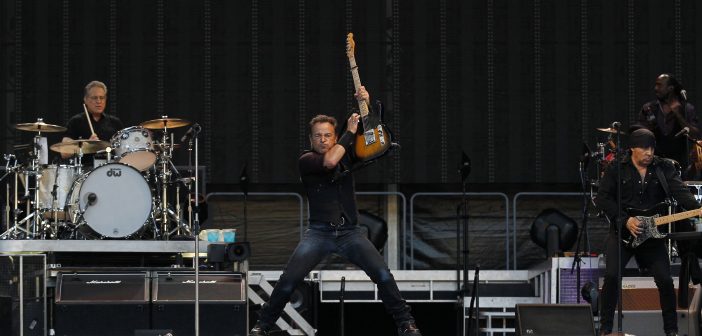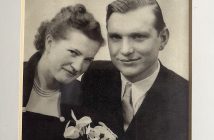The second coming of Christ occurred on September 23rd, 1949. Jesus of Nazareth’s younger brother wasn’t born in the old holy land as many had foreseen though. He was born in the new promised land, on the other side of the Atlantic, in Freehold, New Jersey, United States. Okay, that might not be true. Bruce Frederick Joseph Springsteen of Freehold is likely no son of God. He is, however, my God.
Bruce Springsteen never had a voice like Frank Sinatra’s, never played the guitar like Jimi Hendrix, and never wrote lyrics like Bob Dylan. But he had and has something way more powerful – a deeply rooted connection to the working class, and a window into the light and dark of their lives. That, topped with a ceaseless commitment, on and off stage, is what I think has made him so special and unfathomably loved.
Springsteen came after the rock’n’roll revolution of the 50’s and 60’s. But he wasn’t “just” rock’n’roll. He was blues, soul, country, and folk music too – a perfect mix of the poor man’s music preferences. He was to America what Martin Luther was to Christianity – a distinct voice in the night, calling for justice and change.
Through the centuries, philosophers, poets, authors, painters, and musicians have redeemed people through their art. However, few artists I’ve come across during my short life have done it with the same dedication, passion, and infatuation as Bruce Springsteen. His music speaks to everyone. But more importantly and even more fascinating is how his music can help mend the wounds possessed by the mental and financial subclasses of society.
No art nor God beats the hopeful feeling that arises in my mind when Springsteen wholeheartedly enters a persona and acts out the injustice, suffering, or daily struggle of that character.
You get it. I love Bruce Springsteen to an unhealthy extent. Then I read his book. And his halo was gone. The man I’ve looked up to and hailed as a superhuman was apparently nothing but a bipolar narcissist with daddy issues. What a relief. Bruce “The Boss” Springsteen is a human being with human emotions, human faults, and human issues. This revelation moved me from agnosticism closer to atheism. I realized that his godlike powers don’t stem from supernaturalism. They stem from dedication and hard work. It turned some of my love for him into empathy, even though he is a rich man who has been able to spend his life doings what he loves.
Oh yes, this was supposed to be a book review. Just over two months ago, his autobiography “Born to Run” was released. It received critical acclaim and instantly became a best-seller. Written over a period of seven years, it contains the told success and untold darkness of an American hero.
Before digging into his masterpiece, this is Bruce Springsteen in awards: Last week, he was awarded the nation’s highest civilian honor, the Presidential Medal of Freedom. He has been inducted into the Rock and Roll Hall of Fame, the Songwriters Hall of Fame, and the New Jersey Hall of Fame. During his career, Springsteen received twenty Grammy Awards, one Academy Award, and the Kennedy Center Honors.
I wish I could say his autobiography is 510 pages of absolute magic, but no book can be. Every rose simply has its thorns. “Born to Run” consists of three chronological parts: the first one, “Growin up’,” which deals with his childhood, adolescence, and first two albums; the second one, “Born to Run,” which deals with his great success, 1975-1989, and what came with it; and the third one, “Living Proof,” which deals with the latter part of his life – parenting, depression, losing friends and family members, and music on older days.
I listened to the Swedish podcaster, Fredrik Wikingsson, criticizing the parts of the book containing acknowledgements and childhood stories, labeling them as uninteresting to the reader. I do understand his criticism to an extent, but I tend to disagree. The story of how Bruce Springsteen became Bruce Springsteen is why I believe many fans bought the book; it’s why I bought the book. And it’s consequently why I love the book’s first part – Growin’ up. It’s about how his family, his town, his friends, his mind, and his struggles shaped him.
The second part, Born to Run, is the heart and core of the book. It is like an amazing behind the scenes look into his greatest albums and most celebrated tours. Still, it is packed with entertaining anecdotes and philosophical contemplations.
Living Proof, the book’s third part, is not as strong as the previous two. It’s heavily focused on coming to terms with his past, putting pieces together, and connecting circles. There’s a lot of ranting about this and that, and as a fan, I enjoyed reading it. However, for someone who’s a little less of a fan, it might get boring. For example, what he was doing during the Northridge earthquake is most likely not very interesting to the average Joe.
After “The River Tour” in the early 80s, Springsteen started focusing his writing almost exclusively on social issues. He started to integrate the distance between the American Dream and the American reality into his rock’n’roll. Sure, he had written about working class issues and the Vietnam War before, but for the next three decades, social issues would permeate most of his songs. These are his own beautiful words on what he pursued and succeeded to do: “In my writing I was increasingly interested in the place where “This Land Is Your Land” and “The River” intersected, where the political and personal came together to spill clear water into the muddy river of history.” Wow.
I remember my first true encounter with Bruce Springsteen’s music. 14 or 15 years old and living in Sweden. My best friend and I walked home to his place after school. We always did on Fridays. His parents weren’t home, and they had so much beer, they didn’t notice if we grabbed a few. So we went down to his basement, excitedly opened our beers and turned up the volume on the speakers. Our favorite song at the time was Sting’s “Fields of gold.” But this day, my friend played something else. He was going to show me something new, and he played Springsteen’s “Streets of Philadelphia.” And I’ll never forget it. First, solely drums. Then, the sound of a mysterious keyboard, an angel whispering to you, and only you. Then finally, magic words by a magic voice, signed Bruce Springsteen:
I was bruised and battered, I couldn’t tell what I felt
I was unrecognizable to myself
I saw my reflection in a window, I didn’t know my own face
Oh brother are you gonna leave me wastin’ away
On the Streets of Philadelphia
It remains one of my favorite songs of all time.




